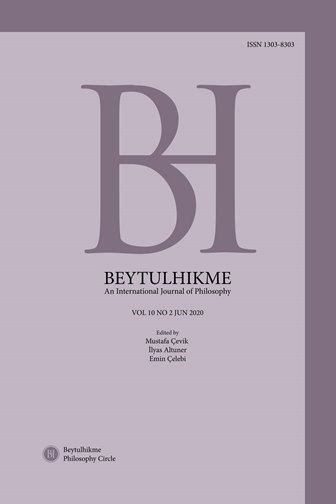Author :
Abstract
W. V. O. Quine'a göre, Rudolf Carnap'ın Der Logische Aufbau der Welt (bundan böyle Aufbau) eseri bilimsel bilgiyi fenomenalistik bir temele indirgemeye çalışan radikal empirisist bir projedir. Quine'nin okumasında, fenomenalistik bir temele sahip olmak, Aufbau’nun temel gayesinin önemli bir parçasıdır. Michael Friedman'a göre ise Aufbau, öncelikle nesnel ve bütünlüklü bilimsel bilgi olasılığını göstermekle ilgilenen neo-Kantçı bir projedir. Bu nedenle, Friedman için, Carnap'ın fenomenalistik dil seçimi daha ziyade tesadüfidir. Bu yazıda hem Quine’ın hem de Friedman'ın Aufbau'nun iki farklı yönüne odaklandığını iddia ediyorum. Nitekim Carnap'ın Aufbau'yu yazdığı sırada bu iki yön Carnap’ın felsefesi için eşit derecede önemlidir. Bu nedenle, Carnap’ın Aufbau adlı kitabı hem radikal empirisist hem de neo-Kantçı amaçları içeren oldukça iddialı bir eser olarak değerlendirilmelidir.
Keywords
Abstract
According to W. V. O. Quine's received view, Rudolf Carnap's Der Logische Aufbau der Welt (henceforth Aufbau) is a radical empiricist project that attempts at reducing scientific knowledge to a phenomenalistic basis. In Quine's reading, having a phenomenalistic basis is an essential part of the thesis of the Aufbau. According to Michael Friedman, on the other hand, Aufbau is a neo-Kantian project that is primarily concerned with showing the possibility of objective and unified scientific knowledge. Thus, for Friedman, Carnap's choice of phenomenalistic language is rather circumstantial. In this paper, I argue that both Quine and Friedman focus on two different aspects of the Aufbau, which as I shall suggest were equally significant and essential for Carnap's philosophical outlook at the time he was writing Aufbau. Hence, Aufbau should be appreciated for its truly ambitious objective that comprises both the radical empiricist and the neo-Kantian goals.
Keywords
- Carnap, R. (1969). The Logical Structure of the World. (Trans. R. A. George). Berkeley: University of California Press.
- Carnap, R. (1947). Meaning and Necessity: A Study in Semantics and Modal Logic. Chicago: University of Chicago Press, 205-229.
- Carnap, R. (1963). Intellectual Autobiography. The Philosophy of Rudolf Carnap. (Ed. P. Schilpp). La Salle: Open Court, 3-84
- Friedman, M. (1987). Carnap’s Aufbau Reconsidered. Nous, 21, 521-545.
- Friedman, M. (1999). Reconsidering Logical Positivism. Cambridge: Cambridge University Press.
- Hylton, P. (2013). Quine and the Aufbau: The Possibility of Objective Knowledge. The Historical Turn in Analytical Philosophy. (Ed. E. H. Reck). Hampshire: Palgrave Macmillan, 78-93.
- Quine, W. V. O. (1969). Ontological Relativity and Other Essays. New York: Columbia University Press.
- Quine, W. V. O. (1980). From a Logical Point of View. Cambridge: Harvard
- Quine, W. V. O. (1995). From Stimulus to Science. Massachusetts: Harvard
- Richardson, A. (1990). How not to Russell Carnap’s Aufbau. PSA 1990, Vol. 1, 3- 14.
- Richardson, A. (1996). From Epistemology to the Logic of Science: Carnap’s Philosophy of Empirical Knowledge in the 1930s. Origins of Logical Empiricism. (Eds. R. Giere & A. W. Richardson). Minneapolis: University of Minnesota Press, 309-332.
- Richardson, A. (1998). Carnap’s Construction of the World. Cambridge: Cambridge
- Tsou, J. Y. (2003). The Justification of Concepts in Carnap’s Aufbau. Philosophy of Science, 70 (4), 671-689. Öz: W. V. O. Quine'a göre, Rudolf Carnap'ın Der Logische Aufbau der Welt (bundan böyle Aufbau) eseri bilimsel bilgiyi fenomenalistik bir temele indirgemeye çalışan radikal empirisist bir projedir. Quine'nin okumasında, fenomenalistik bir temele sahip olmak, Aufbau’nun temel gayesinin önemli bir parçasıdır. Michael Friedman'a göre ise Aufbau, öncelikle nesnel ve bütünlüklü bilimsel bilgi olasılığını göstermekle ilgilenen neo-Kantçı bir projedir. Bu nedenle, Friedman için, Carnap'ın fenomenalistik dil seçimi daha ziyade tesadüfidir. Bu yazıda hem Quine’ın hem de Friedman'ın Aufbau'nun iki farklı yönüne odaklandığını iddia ediyorum. Nitekim Carnap'ın Aufbau'yu yazdığı sırada bu iki yön Carnap’ın felsefesi için eşit derecede önemlidir. Bu nedenle, Carnap’ın Aufbau adlı kitabı hem radikal empirisist hem de neo-Kantçı amaçları içeren oldukça iddialı bir eser olarak değerlendirilmelidir. Anahtar Kelimeler: Carnap, Quine, Aufbau, inşa sistemi, bilimsel bilgi.





